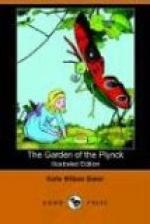“I make it a rule,” the Plynck was saying, as Sara dropped the curtain behind her the next morning, “to fly around the fountain at least twice every day.” As she spoke, she reached out and took, from a bundle that lay within easy reach in a crotch of the Gugollaph-tree, something that looked like a little ivory stick. She snapped it easily with one golden claw, dropped the fragments, and reached out with careless grace for another.
“Oh,” breathed Sara, clasping her hands. And she could not help adding, shyly, “If I could only see you when you fly—Madame Plynck!”
Sara was very proud of herself after she had said that. She had never called anybody “Madame” before, but she had read it in books, and it seemed just the title for a creature so beautiful and gentle and stately as the Plynck. It seemed so suitable that it gave her courage to repeat, “If I could only see you fly!”
“But I don’t do it often, you see,” answered the Plynck, quietly.
“Why—!” exclaimed Sara. “I thought you just said—” Not for worlds would she have seemed rude or impolite to the Plynck, but she was completely puzzled.
The Plynck looked very kind. “I said I make it a rule,” she said, gently. “I didn’t say—you explain it to her,” she said suddenly to her Echo in the pool, who had been looking on with rather an amused expression.
The Echo fluffed out her deep blue plumes a little and took up the task. “What are rules for, my dear?” she began.
“Why—to keep, I guess,” ventured Sara, a little flustered. “Aren’t they?”
The Echo glanced up at the Plynck with a twinkling smile. “Do you hear that?” she asked. “Bless the child! She says rules are made to keep!” She laughed to herself a little longer, then she turned to Sara more soberly. “As far as your country is concerned, my dear, you are doubtless right, and I suppose it’s important for you to keep that fact in mind. But here it’s very different. Our rules are made to break. Don’t you hear the Plynck breaking them?”
So that was what she was doing! For the first time, Sara understood why she had so enjoyed the delightful little snapping sounds, which made her think of corn dancing against the lid of a corn-popper—or of the snapping of little dry twigs under the pointed shoes of a brownie, slipping through the woods alone on Christmas Eve. She thought it was the most completely satisfying sound she had ever heard. She thought, too, that the broken rules under the tree made a charming litter, and wished that the Gunki who were raking them up would leave them there instead. But they went on piling them into wheelbarrows and trundling them down the road toward the smithy.
“They are taking them to be mended,” said the Echo of the Plynck, who had been watching her. “We believe in conservation, you see. Schlorge mends them one day, and she breaks them the next, and so we usually have plenty.”




